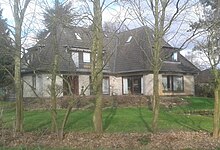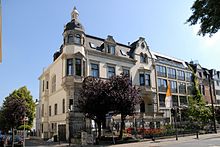Hans Joachim Kauffmann
Hans Joachim Paul Richard Kauffmann (born June 16, 1926 in Stuttgart ; † February 8, 2008 in Achim near Bremen) was a German conductor, composer and university professor.
Life
Kauffmann was the only son of Fritz Kauffmann (1886–1971) and his wife Charlotte.
His great-great-grandfather Ernst Friedrich Kauffmann was a composer and mathematics professor in Ludwigsburg . He was one of Eduard Mörike's circle of friends and, alongside Louis Hetsch, was the dedicatee of Mörike's Mozart on the trip to Prague (1855). His great-great-uncle Karl Emil Kauffmann (1836–1909) was the university music director in Tübingen.
Musical and professional career until 1968
Hans Joachim Kauffmann received his education at the Karls-Oberschule in Stuttgart, the Horst-Wessel-Oberschule in Heidenheim and the Musikhochschule Stuttgart . In addition, he worked as a music teacher from the mid-1940s and directed a band and a school orchestra as part of the Hitler Youth . In 1950 he completed his studies with the artistic maturity examination in conducting and composition; at the same time he obtained the right to exercise the artistic teaching post in higher schools.
The family owned the Dr. Fritz Kauffmann , who inspired Hans Joachim Kauffmann to create his own compositions. The young Kauffmann set poetry from this collection to music, but also other pieces. With the patronage of his father, Kauffmann was allowed to act several times as a guest conductor in performances by the Stuttgart Philharmonic between 1951 and 1961.
From 1950 to 1954 Kauffmann worked at the Staatstheater Stuttgart as a répétiteur and deputy choir director, in addition he worked as a conductor of the Academic Orchestra and the Academic Choir of the Technical University of Stuttgart . He then worked in Koblenz as choir director and conductor at the local theater and founded a madrigal choir in 1955 (today: Bach Choir Koblenz).
In 1961, his father placed him in the context of the search for a successor to the German conductor Carl Caelius, who was retiring for reasons of age, as his successor there, which was transferred to him by the Kyoto Symphony Orchestra as a board member of the German Stage Association . In return, it was agreed between the city of Stuttgart and the city of Kyoto that the Japanese conductor Kazuo Yamada, a student of Helmut Fellmer, could gain some time as a violinist with the Stuttgart Philharmonic with German orchestral practice. Kauffmann's engagement as chief conductor was planned for four years. His engagement began in September 1961, but ended in August 1963 after 23 months. He was followed by the Japanese conductor and flautist Tadashi Mori (1921–1987), who expanded the orchestra to around 80 musicians. However, Kauffmann stayed in Japan for the four years and worked the remaining time as a visiting professor at the Kyōto Music Academy.
After his return from Japan in 1964, Kauffmann worked as a lecturer at the Heidelberg University of Music and Drama, there from January 1965 as its deputy director and director of the school's chamber orchestra .
Director of the Bremen Conservatory
In 1968 he succeeded General Music Director (GMD) Hellmut Schnackenburg as director of the Conservatory of the Free Hanseatic City of Bremen , which at that time was a private educational institution with the rank of a technical college .
On April 17, 1968, he was officially introduced to this office in a ceremony in the town hall and presented himself to the public with an inaugural lecture on music history and philosophy under the motto music education as a regulatory factor. Against the background of the state-controlled music industry in the Third Reich, this philosophy of music education was also controversial within his institute.
The direction of the youth concerts of the Bremen Philharmonic , which his predecessor Schnackenberg had entrusted to him when he took office as new director in 1969, was withdrawn from Kauffmann in 1975 by the Philharmonic Society ; GMD Hermann Michael took over the management . From then on, his artistic work until his retirement in 1991 was limited to the direction of the orchestra of the conservatory, with the auditorium of the Waldorf school as the main venue.
During the institutional integration of the vocational department of the conservatory in 1979 into the University of Fine Arts and Music in Bremen - teaching continued to be at Osterdeich - Kauffmann was taken over as head of the music department. Under the rectorate of Felix Müller, he was responsible for adapting the administrative, training and personnel structure to the rectorate constitution of the self-governing Bremen universities of applied sciences according to the requirements of the Senate administration. In the election for university management in 1990, Jürgen Waller was elected as the new rector and Kurt Seibert as head of the music department, replacing Kauffmann in this function. Kauffmann taught, among other things, the subjects of music analysis , conducting and harmony.
In 1991 he retired and gave his farewell concert with the HfK orchestra in the town hall.
Private life
In 1981/82 Kauffmann built a house for himself in Eißel near Thedinghausen . In 1986 he married his former student, the private music teacher Sabine Erhardt (* 1956), with whom he had two children.
In 1991, after his retirement and the death of his mother, Kauffmann sold the Dr. Fritz Kauffmann from his father's possession for DM 985,000 to the German Literature Archive in Marbach , where it is now archived. The purchase of the collection for the archive was financed with tax money from the Baden-Württemberg Cultural Property Foundation, the State Cultural Foundation and the proceeds of the private Fritz Thyssen Foundation .
Works
Almost all of Kauffmann's compositions are poetry set to music, always for one voice and piano. He was familiar with this genre due to the accessibility of his father's extensive collection. After 1965 - his father's collection was from that year on as a permanent exhibition in the Wilhelmspalais in Stuttgart - no more compositions by him are known. After his death, the complete works were compiled and published by his colleagues Hans Jürgen Feilke and Paul Bialek.
Kauffmann's compositions are rich in different facets and their structure is based on the emotional core of the respective underlying poetry. He was described as stylistically unaffected throughout, who brought personal expressiveness to his composition with a deep and deep understanding of the text. Exact knowledge of the technical vocal possibilities, virtuoso handling of counterpoint , imaginative harmony , form awareness and, last but not least, a willingness to experiment all flowed together in the compositions.
selection
- The eternal guide to a poem by Theodor Lüddecke for a voice and piano (Kauffmann was involved in the Hitler Youth at the time )
- Little Sonata in C for piano , composed in 1947
- Variations on “A little man stands in the woods” for piano, composed in 1947
- String quartet in one movement , composed in 1948
- 3 songs for voice and piano , composed between 1936 and 1940 (lyricist: Eduard Mörike)
Individual evidence
- ^ A b c Hans Jürgen Feilke: Hans Joachim Kauffmann. Complete song edition . 2009. Digitized version ( Memento of the original from February 19, 2016 in the Internet Archive ) Info: The archive link was inserted automatically and has not yet been checked. Please check the original and archive link according to the instructions and then remove this notice.
- ^ Landesarchiv Baden-Württemberg, State Archives Ludwigsburg, EL 221/10
- ↑ Ruth Renée Reif, Die Stuttgarter Philharmoniker, Silberburg-Verlag 1999, p. 165 ff.
- ↑ Homepage of the Koblenz Bach Choir
- ↑ a b Klaus Blum, Musikfreunde und Musici, musical life in Bremen since the Enlightenment, Hans Schneider , Tutzing 1975, p. 565 f.
- ↑ Contribution by Hans Joachim Kauffmann, in pian e forte, chronicle 10 years of the music department at the University of the Arts Bremen , HM Hauschild, Bremen 1998, p. 12 and 13
- ^ Simon Neubauer: Music as a means of education. Meeting in the Weser-Kurier on April 18, 1968.
- ↑ Dr. jur. Klaus Gätjen (public representative of the Conservatory Association): Address on the 25th anniversary of the Conservatory on March 14, 1974, Music School Bremen / Volume 11 / 1972–1974; Bremen State Archives [7, 1034-46], pp. 12-17.
- ↑ Farewell concert. Weser courier . June 22, 1991, number 143, p. 25.
- ↑ Catalog for the Dr. Fritz Kauffmann
- ^ Theodor Lüddecke, The Eternal Leader. In: A selection of German poems from the beginning to the present, Halle (Saale) 1936, p. 712.
| personal data | |
|---|---|
| SURNAME | Kauffmann, Hans Joachim |
| ALTERNATIVE NAMES | Kauffmann, Hans Joachim Paul Richard (full name) |
| BRIEF DESCRIPTION | German conductor, composer and university professor |
| DATE OF BIRTH | June 16, 1926 |
| PLACE OF BIRTH | Stuttgart |
| DATE OF DEATH | February 8, 2008 |
| Place of death | Achim near Bremen |

